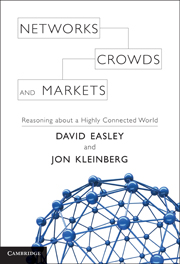Book contents
- Frontmatter
- Contents
- Preface
- 1 Overview
- Part I Graph Theory and Social Networks
- Part II Game Theory
- Part III Markets and Strategic Interaction in Networks
- Part IV Information Networks and the World Wide Web
- 13 The Structure of the Web
- 14 Link Analysis and Web Search
- 15 Sponsored Search Markets
- Part V Network Dynamics: Population Models
- Part VI Network Dynamics: Structural Models
- Part VII Institutions and Aggregate Behavior
- Bibliography
- Index
15 - Sponsored Search Markets
from Part IV - Information Networks and the World Wide Web
Published online by Cambridge University Press: 05 June 2012
- Frontmatter
- Contents
- Preface
- 1 Overview
- Part I Graph Theory and Social Networks
- Part II Game Theory
- Part III Markets and Strategic Interaction in Networks
- Part IV Information Networks and the World Wide Web
- 13 The Structure of the Web
- 14 Link Analysis and Web Search
- 15 Sponsored Search Markets
- Part V Network Dynamics: Population Models
- Part VI Network Dynamics: Structural Models
- Part VII Institutions and Aggregate Behavior
- Bibliography
- Index
Summary
Advertising Tied to Search Behavior
The problem of Web search, as traditionally formulated, has a very “pure” motivation: it seeks to take the content people produce on the Web and find the pages that are most relevant, useful, or authoritative for any given query. However, it soon became clear that a lucrative market existed within this framework for combining search with advertising, targeted to the queries that users were issuing.
The basic idea behind this is simple. Early Web advertising was sold on the basis of “impressions,” by analogy with the print ads one sees in newspapers or magazines: a company like Yahoo! would negotiate a rate with an advertiser, agreeing on a price for showing its ad a fixed number of times. But if the ad you're showing a user isn't tied in some intrinsic way to their behavior, then you're missing one of the main benefits of the Internet as an advertising venue, compared to print or television. Suppose, for example, that you're a very small retailer who's trying to sell a specialized product; say, for example, that you run a business that sells calligraphy pens over the Web. Then paying to display ads to the full Internet-using population seems like a very inefficient way to find customers; instead, you might want to work out an agreement with a search engine that said, “Show my ad to any user who enters the query ‘calligraphy pens'.”
- Type
- Chapter
- Information
- Networks, Crowds, and MarketsReasoning about a Highly Connected World, pp. 385 - 422Publisher: Cambridge University PressPrint publication year: 2010
- 1
- Cited by



